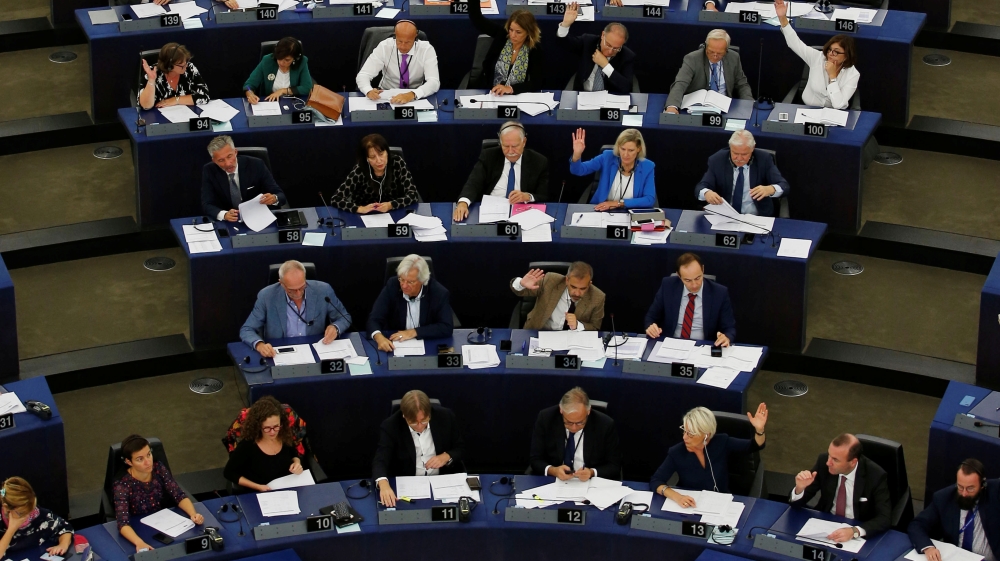Explained: EU parliament targets Hungary’s ‘breach of values’
The European Parliament on Wednesday voted to launch punitive action against Hungary for breaching the bloc’s core values in a move that might bring unprecedented political sanctions against the Budapest government.
It is the first time ever the EU legislature triggered the disciplinary Article 7 procedure against an EU member state that has the potential to strip Hungarian government, led by controversial Prime Minister Viktor Orban, of its EU voting rights.
The motion, written by Dutch Greens Member of European Parliament (MEP) Judith Sargentini, was passed with over two-third of the ballots in the 751-member institution.
Here is what Article 7 is about, how significant this decision is and what might happen next.
What is Article 7?
The Article 7 of the Treaty of the European Union, or TEU – which established the bloc in 1992 – seeks to protect the EU values defined in Article 2.
Article 2 lists the founding values of the EU as “human dignity, freedom, democracy, equality, the rule of law and respect for human rights, including the rights of persons belonging to minorities”.
Under Article 7, if it is found that there is “a clear risk of a breach” of EU values by a member state, the Council of Ministers “may address recommendations to it“.
The Council could also find that a member state has committed “a serious and persistent breach” of core values, in which case, Article 7 allows for the “suspension of certain of the rights [of the member state in question], including the voting rights”.
The Council of Ministers – made up of member state ministers – is the second legislative organ of the EU in addition to the European Parliament.
Article 7 entered into force in May 1999 with the Amsterdam Treaty, one of several treaties amending the TEU, and took its current shape with the Nice Treaty, effective since February 2003.
What is next?
The issue will come before the Council in line with the Article 7 procedure. It is unclear when the Council will add this issue to its agenda, but it is not expected anytime soon.
Poland, which is facing a similar process, has already said that it would veto a decision against Hungary. Hungary also backs Poland over Warsaw’s clash with the EU.
|
Hungary PM dogged by corruption allegations |
The Council can decide that there is “a clear risk of a serious breach” if four-fifths of its member states vote in favour after hearing Hungary.
Alternatively, it may determine “the existence of a serious and persistent breach” if all member states other than Hungary vote for it. In case this happens, the Council can, in a separate vote, block Hungary’s voting rights with a qualified majority.
However, it is not likely with Poland’s stance against the move.
According to Baydarol, it is not easy to give a timeline for the rest of the process as it will depend on Hungary’s actions.
“How and when the rest of the process will unfold is up to what Hungary will do in the coming days. We will see if they will take it seriously and address it,” he told Al Jazeera.
“Hungary will now seek diplomatic support and try to lobby right-wing European governments and parties, in addition to the Polish government, to raise their voices against the European Parliament move.”
Did anything similar happen before?
It is unprecedented for the European Parliament to initiate the Article 7 procedure. However, the European Commission, the executive organ of the EU, started the process against Poland in December 2017 with concerns over rule of law and independent judiciary amid rapid judicial changes in that country.
A similar de facto move was carried out against Austria in 2000, when far-right Freedom Party led by Jörg Haider became coalition partner following the October 1999 elections. He was the first far-right leader that came to power since World War II.
The member states diplomatically isolated Austria, with some members threatening the country with cutting bilateral relations. Furthermore, the European Parliament called for suspension of Austria’s membership. As a result of the pressure, Haider could not become chancellor.
“In those days, the Article 7 was not triggered, but the 14 other member states of the time used the threat of it against Austria as a unified bloc. Haider left the chancellor chair to its coalition partner of the time as a result of the pressure,” Can Baydarol, an EU expert and co-chair of European Union and Global Research Association, told Al Jazeera.
 |
| The EU Parliament motion was passed with over two-third of the ballots in the 751-member institution [Reuters] |
What is the significance of the vote?
The vote highlights Hungary’s alleged breaches such as control over the courts, the curbing of freedom of expression, government intervention into media, the threat to academic freedom and the curtailed rights of migrants.
Actions against both Poland and Hungary were taken amid a rise of far-right parties within the EU, the recent being the electoral success of anti-immigrant party in Sweden.
According to Baydarol, the European Parliament decision aims to show that the EU has the necessary tools to act if its core values are threatened by a member state.
“You cannot be in a bloc and act against its criteria without any consequences. Such decisions act as a deterrent to prevent similar actions,” Baydarol said, referring to changing political scene within the EU.
Follow Umut Uras on Twitter: @Um_Uras




